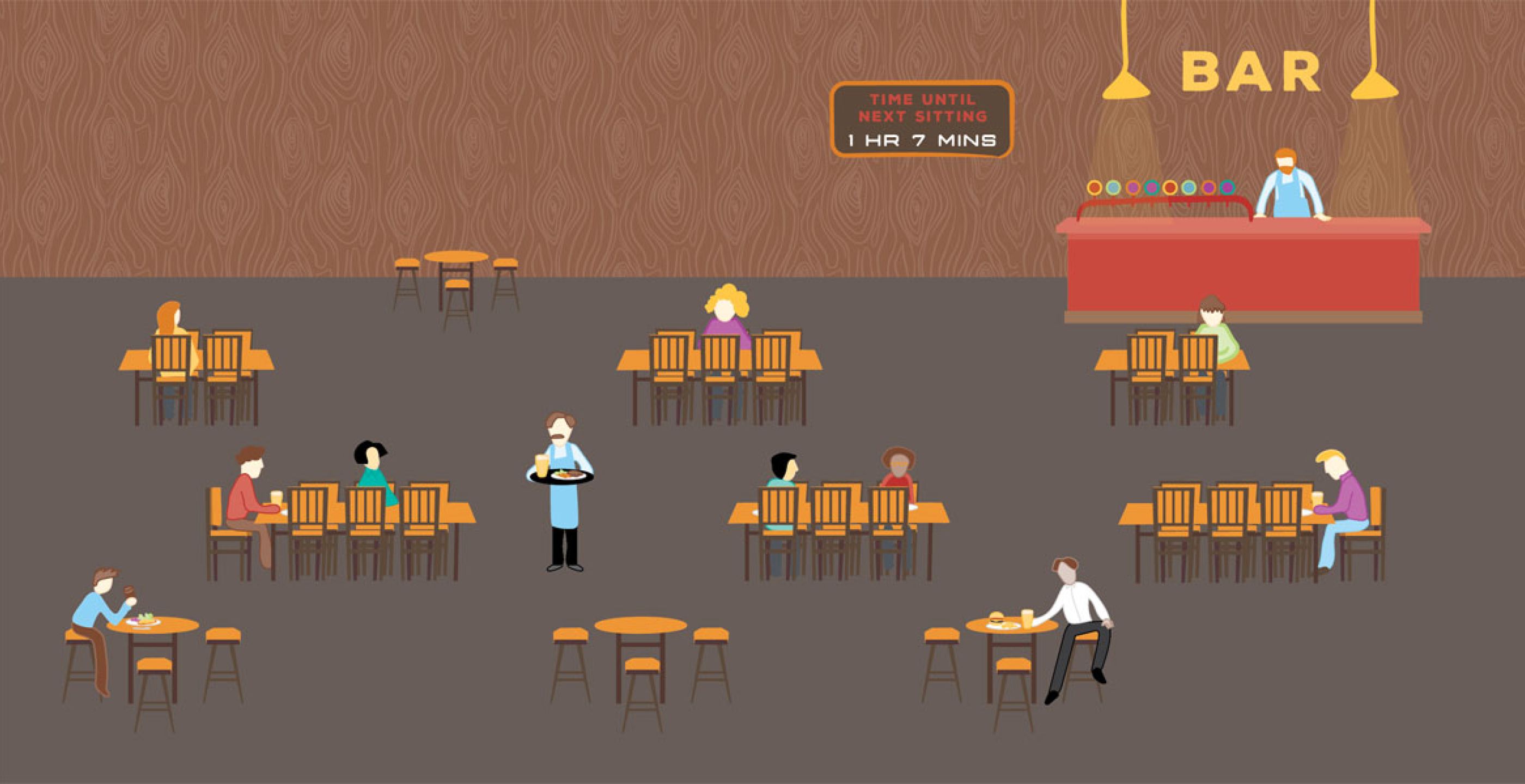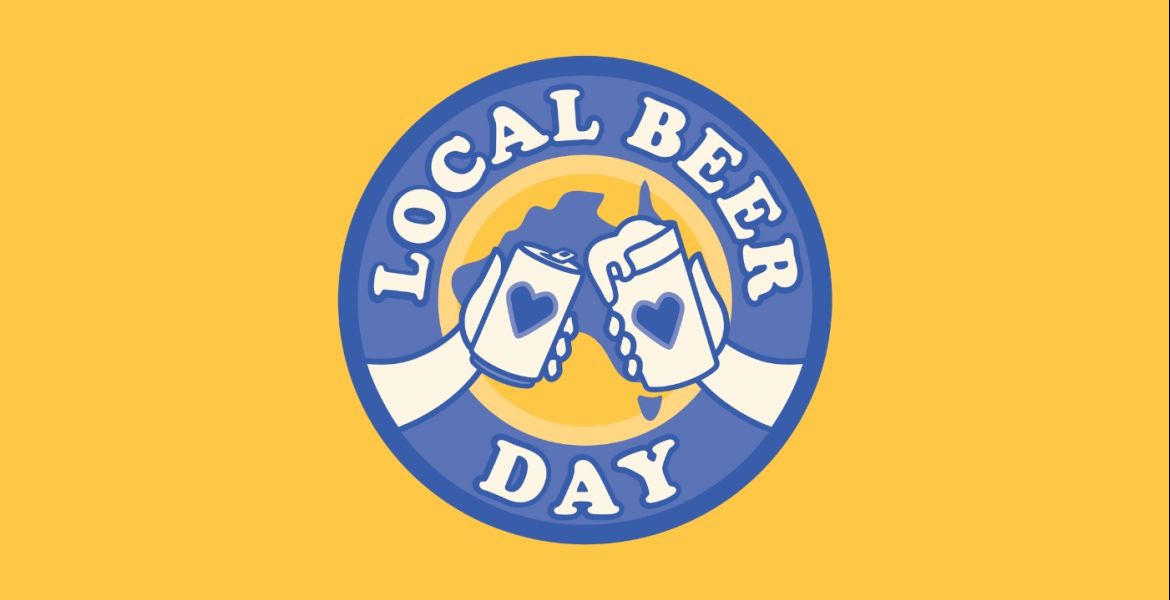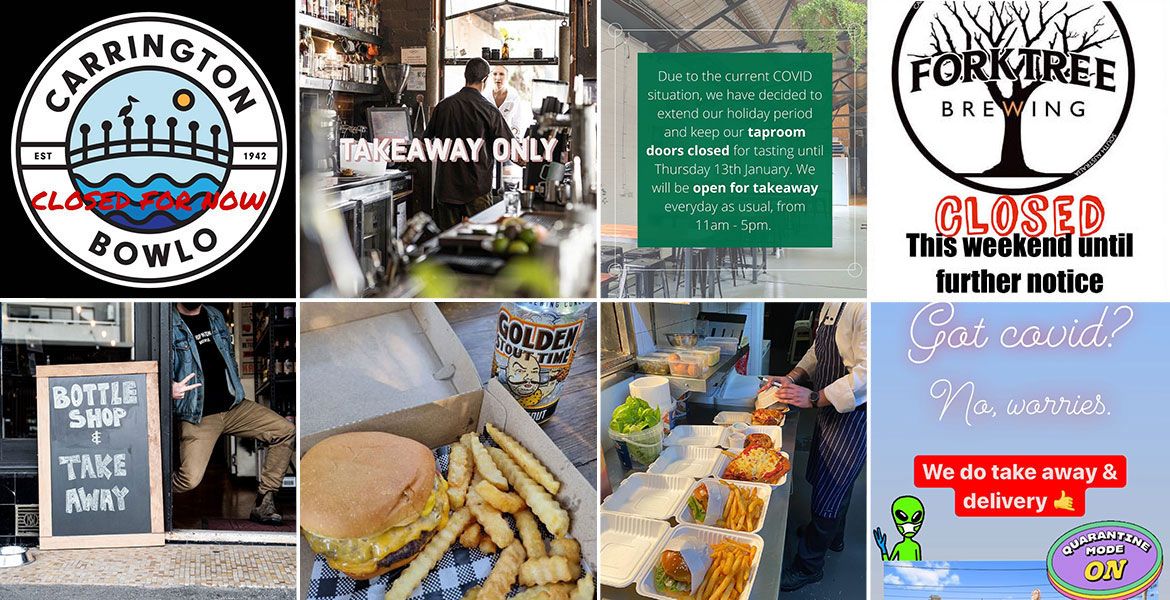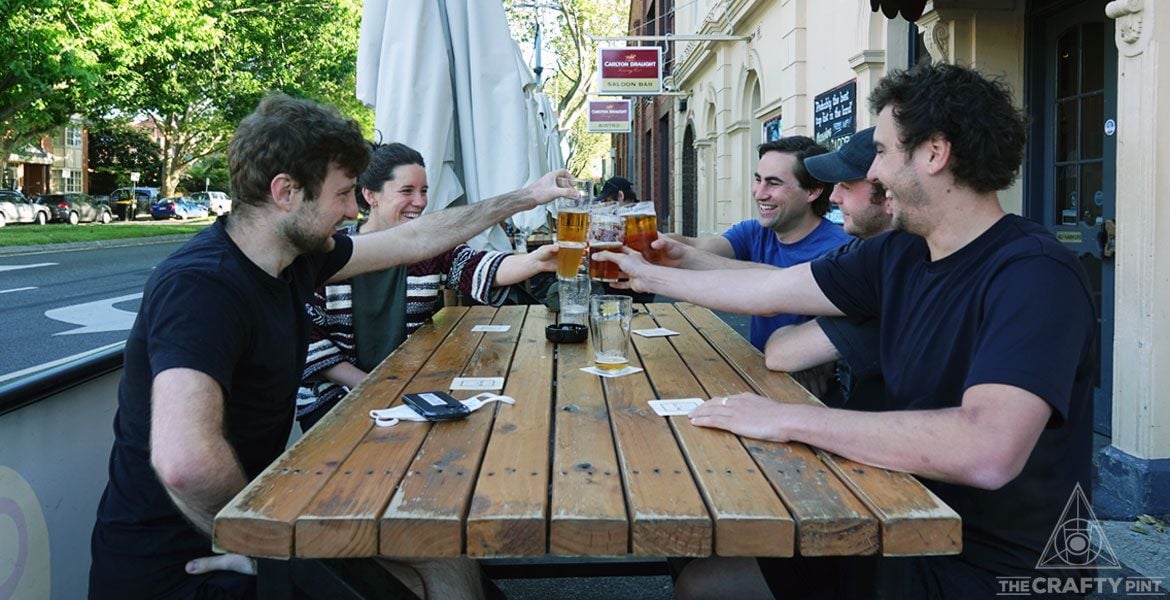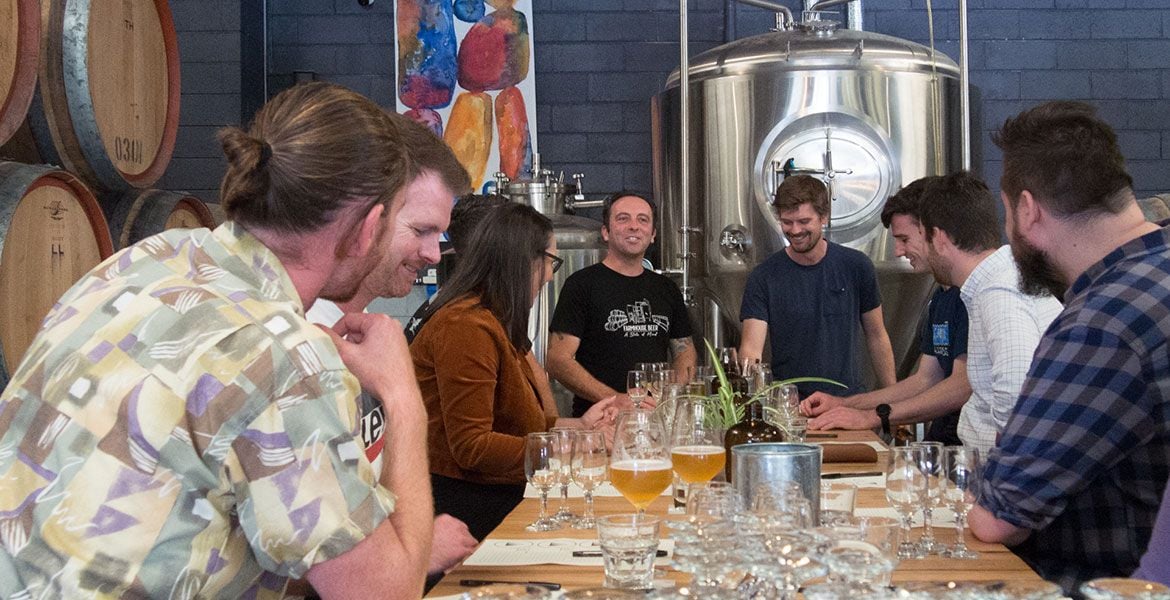Across Victoria today, many people will have enjoyed their first pub meal in more than two months as the state became the last in Australia to allow pubs, bars, cafés and restaurants to open doors closed to the public since March 23.
Given the fears of the early days and weeks of the lockdown – a time when some wondered if they’d be open again within six months – welcoming familiar faces back after 70 days will be a timely boost for many.
Indeed, while it might feel glib to describe as lucky a situation in which more than a hundred people have already died and tens of thousands have lost their jobs, compared to other parts of the planet, we have – like New Zealand – survived the COVID-19 pandemic to date relatively unscathed.
There’s much to celebrate in that, as well as the gradual return of some aspects of our lives we used to take for granted. But how significant is today’s milestone in our journey through the pandemic? How much cause is there for a celebratory beer if you’re part of the wider beer and hospitality community?
Already, an estimated ten percent of venues across the country have closed for good since March, including some with craft beer at the heart of their offering: the King’s Head in Adelaide; Fishers in Melbourne; The Flying Scotsman / Caboose in Perth; and Darleen’s Taphouse in Busselton among them. According to the Night Time Industries Association (NTIA), which launched the Keep Our Venues Alive campaign, this is expected to rise significantly.
And, just because business owners can open their venues now, many are choosing not to as the trading conditions under which they are expected to operate – limitations on numbers of patrons, the need for customers to eat with their drinks, for example – mean it’s simply not viable or, in some cases, possible.
Add in contact tracing requirements, the need to manage the expectations of customers unaware of such trading conditions, the likelihood of social distancing remaining in place even as maximum capacities increase, the risk of a second wave, plus the scheduled end of JobKeeper support in September, and this is far from a return to normal.
If anything, it remains a time of uncertainty piled upon uncertainty. One of questions, hopes and fears.
Having adapted and innovated to find a way to survive the initial shutdown, there’s a sense of cautious optimism among many I’ve spoken to, an optimism balanced by an expectation that any end to government support for the wider hospo industry will prove the straw that breaks the camel’s back for some. And that a lengthy period of survival amid challenging circumstances lies ahead.
Michael Rodrigues, co-founder of Time Out in Australia and NTIA chair, likens the situation for business owners to a computer game – one where you complete each level only to come up against bigger bosses each time. And the ultimate reward?
“The prize for surviving COVID is you're in a recession market and the restrictions mean you can't trade properly," he says.

Since the pandemic started to wreak havoc throughout the country’s hospitality industry, the New South Wales based NTIA has been piecing together a picture of just how severe the damage will be while working with the Federal and state governments on a recovery plan. And it’s not a pretty picture: estimates of insolvency within the industry range from 30 to 50 percent; by the end of June, nearly half a million – or more than 50 percent – of jobs in the sector could be gone.
Beyond that, he points to the potential loss of income from October to December, typically a boom period for hospitality thanks in part to Christmas functions: are corporates going to take a chance with their brand and risk infection at their annual end-of-year party or find some other way to reward staff, for example?
“We’ve gone from bushfires, then COVID and then into a period of physically distanced trading that will see a few more go out of business because they’re on their last legs,” he says.
While he admits such a prognosis is far from rosy, he believes government and industry focus needs to be on the medium- and long-term prospects for the industry rather than the minutiae of ever-changing guidance around day-to-day operations.
What does it mean for businesses if consumers demand more value-driven offerings? If you can only afford to reopen your venue once, do you do it now or wait to see how things look a few months down the track?
Will pent up demand lead to a better-than-expected October to December period and a recovery in 2020, or will a slow end to the year be followed by tumbleweed in the New Year? Do you try to manage losses for the next six months – “Batten down the hatches then try to catch a wave in the recovery,” as Michael puts it.
As he works with stakeholders to put recommendations for ‘The Road To Recovery’ in front of government departments – extension of JobKeeper for employees working in the night-time industries, the flexibility to use spaces like car parks to increase capacity while complying with social distancing, and a freeze on alcohol excise duty rate on beer and spirits among them – there are plenty for whom today represents another step on what they hope will be their own road to recovery.
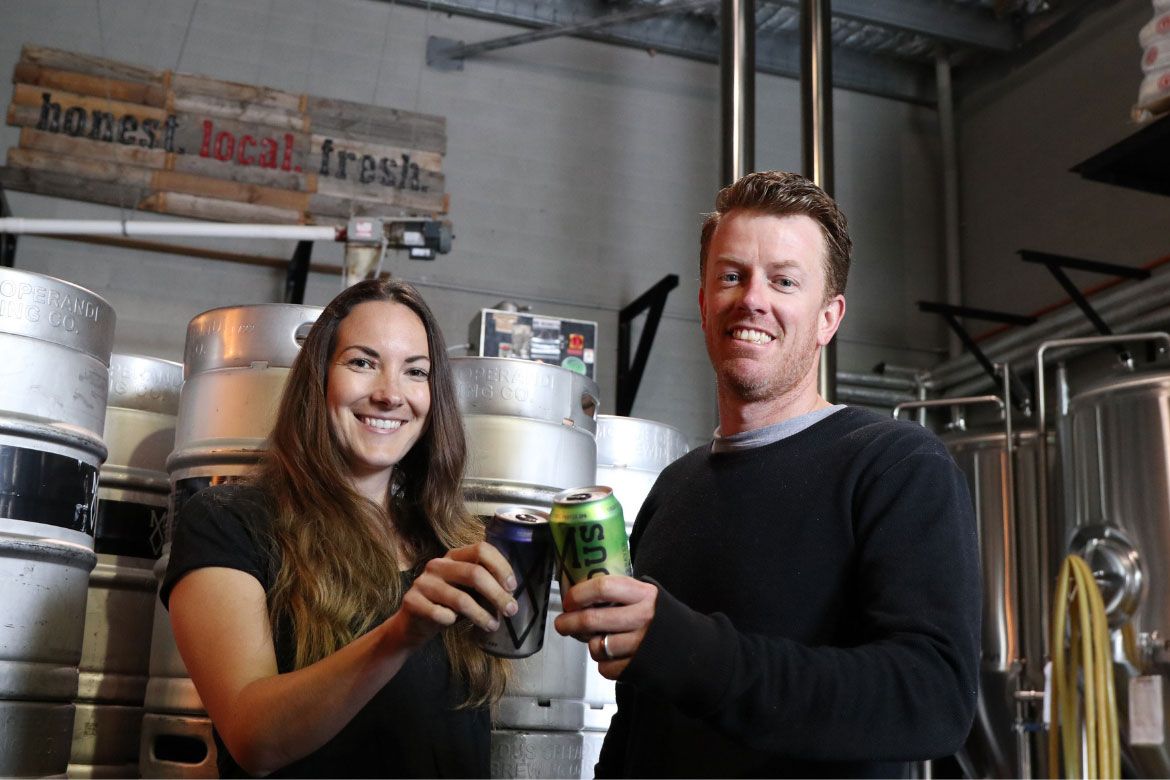
For Grant Wearin, co-owner of Modus Operandi Brewing Co in Sydney’s Northern Beaches, the easing of restrictions in NSW to allow a maximum of 50 patrons is like “a light at the end of a tunnel”. While it represents just a quarter of the brewpub’s maximum capacity, he says it’s a level at which you can potentially make money – something he says wasn’t possible under tighter restrictions.
“The government here in New South Wales has just done a bloody good job,” he says. “They got a tough balance really right.”
He says the need to offer table service and keep people seated creates challenges but also gives them the chance to bring back some of their casuals. And they’re welcome challenges compared to those of the past few months.
“We’ve not had anything to celebrate or smile about for 12 weeks,” he says, adding that those he’s spoken to around the state “are as optimistic as they can be that they can trade with 50 people.”
For those Victorians who chose to open their venues for the first time in ten weeks today, they remain on a tighter leash as they get their heads around the 30 page guideline document they received a week ago.
In the case of Iain Ling, The Shout’s Publican of the Year at the helm of The Lincoln in Carlton, he describes the first week back as “a whole lot of nobody knows”. It’s one in which they’re operating with a reduced menu and looking to sell through existing stock to alleviate some of the pressure caused by the shutdown.
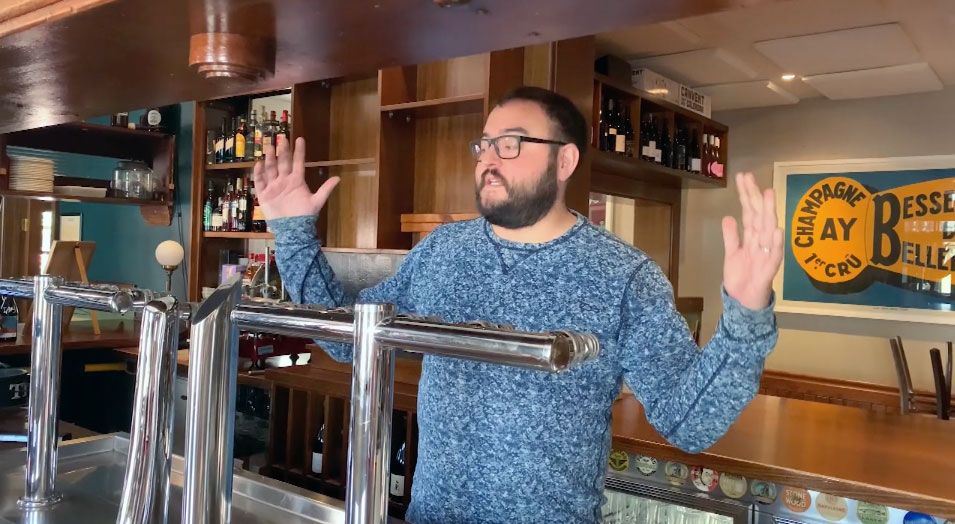
“The big thing is, we don’t know where people are at,” he says. “The pub is a public house. People are used to being able to walk in and get a pot while standing at the bar. Now we just can’t do those things.
“Are people going to try to get a beer? How many times am I going to have to repeat myself? This information [on how venues have to operate] isn’t freely available.
“We’ll sit down at the end of each service – what’s working and what’s not? Do we need an extra staff member?
“It could be amazing. It could be terrible. It’s not like you can call one of the old blokes and ask what it was like in ’74 – we’re making the rules for this.”
Current government rules for Victoria mean one of the state’s best-loved craft beer venues won’t be opening just yet. The team at Carwyn Cellars has been impacted far less than many of their peers thanks to the strength of their bottleshop and online retail, so they’ve taken the opportunity to renovate.
“While JobKeeper is happening, we will all be able to get through,” says owner Ben Carwyn. “If it stops and we can’t get back to full capacity, we’ll see a lot of people shut up and not reopen.
“I’ve got a lot of friends with small bars and emotionally they’re done. So if we find people aren’t going out, that’s where we’re going to see the mass closings. If people don’t get their Christmas trade, that’s really going to hurt.”

Yet, perhaps unsurprisingly in an industry that was able to innovate and adapt almost overnight when the spread of COVID-19 accelerated in early March, there are those, like the Carwyn team, looking ahead with some confidence.
At Otherside Brewing in Fremantle, for example, while they have little idea when live music will return to their Freo.Social venue, they managed to refocus the brewing side of the business so well that all draught volume they lost has been made up in sales of cans. Their new online store is one of many to enjoy significant take-up as beer fans switched to supporting local from their armchairs.
I've spoken to other brewery owners who've been reworking business plans that were heavily hospitality-focused to increase their packaged presence in the market, even if it's just a temporary measure until they can return to plan A.
There are other factors that offer hope too, not least that there are plenty of people out there whose livelihoods haven’t been significantly impacted.
“People are just bored. There’s not been that much hardship,” Iain says, drawing a contrast between the rapid flattening of the curve here and the handling of the crisis in countries like the UK and US.
“A lot of people are at home and not spending money. There is money out there, it’s just the fact that all the people we talk to are in the same boat as us.”
With overseas travel not on the cards for months to come, he says people are still going to need escapes, which presents an opportunity for those in the business of delivering enjoyment.
“It’s up to us to challenge ourselves,” he says. “Hardship breeds creativity. History tells us that.”
Among those who were in the business of delivering enjoyment pre-COVID – literally, by the busload – are Joslyn Erickson and Matt Farrelly of Gold Coast-based Hop On Brewery Tours (pictured below). As with their beer tour peers across the country, when venues closed up their business had to shut down; they knew the game was up when, midway through a tour of Green Beacon on March 21, word came through about another change to restrictions and their group had to leave.
Joslyn says they’re still not sure when they’ll start tours again; some of the breweries they visit don’t offer food so remain closed to the public, but she says there is a confidence that people will start to go out again – and that they’ll continue to support local after doing so through April and May.
“I think, if anything, this has made people realise what’s in their backyard,” she says. “We saw it especially at the beginning of all this – support your local café or restaurant – so I hope there’s no turning away from this.”
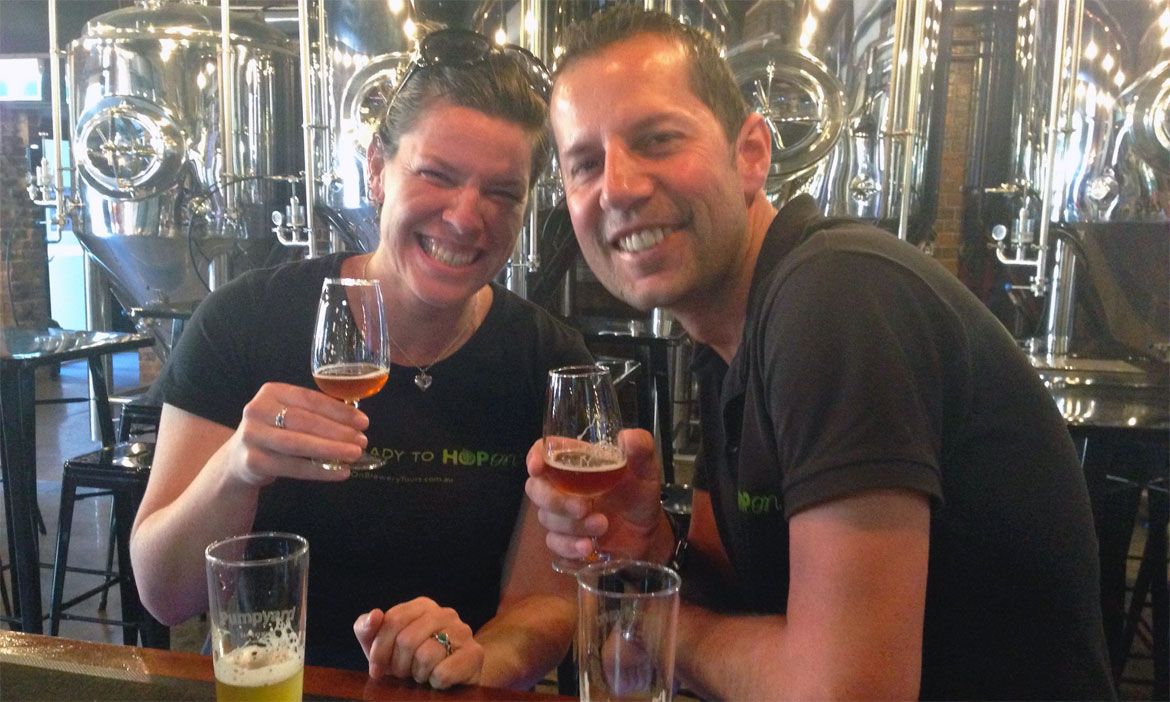
Camaraderie remains strong too. A couple of weeks ago, the couple headed into Brisbane to visit some of their favourite venues once they’d reopened, planning to spend some money on takeaways while checking in on them.
“Everyone was just asking how we were going,” Joslyn says. “They wouldn’t let us pay for beers and everyone was trying to support each other. It was very heart-warming, even if it wasn’t what we intended.”
Such support will play a major role in the recovery too. The potential human toll of this pandemic goes beyond employment stats, insolvencies and risks of infection.
Having fought to get this far, business owners have to keep trying to make the best decisions they can with little precedent to fall back on; just as national leaders are weighing up the health of their subjects against the health of their economy, within each business there is someone weighing up the safety of their employees against their financial needs.
“It’s a very proud industry where understandably no one wants to say, ‘It didn’t work out for me,’,” Michael says.
“I hope more people come out and talk about their challenges openly rather than switching off their phones and going dark. We are doing what we can to try to save as many businesses as possible - but 'It’s OK to fail' is a message that I hope comes out.”
Given the hits businesses have suffered to date – many of them copping the double blow of bushfires and COVID-19 – and those that lie in wait as government support dries up and the recession kicks in, more closures are inevitable, especially if there are future spikes in infections which lead to individual venue closures or the reintroduction of tougher restrictions.
“The broader industry will see a reduction in the total number of venues and that's sad because diversity is one of the great things we have going for our scene here,” Grant says.
“On the flipside,” he adds, “there are good businesses where this will have galvanised them. If you can survive this most unprecedented global situation and come out the other side, there’s a lot of value in that.”
Those that survive will be hoping recent weeks will have had a galvanising effect on consumers too, and that the desire to support local breweries and venues we’ve witnessed through the #keepinglocalalive campaign has had time to take root. The campaign message – "The future of local beer – it's in your hands" – is as relevant now as it was on March 23, if not more so.
“We need people to act responsibly and be grown up and understand that one wrong move by one person could have enormous repercussions,” Iain says.
"If you are sick, stay home. When you come to the pub, you have to stay at your table.
“It's a privilege to be in one of our venues now. You can't act like a dick.”





